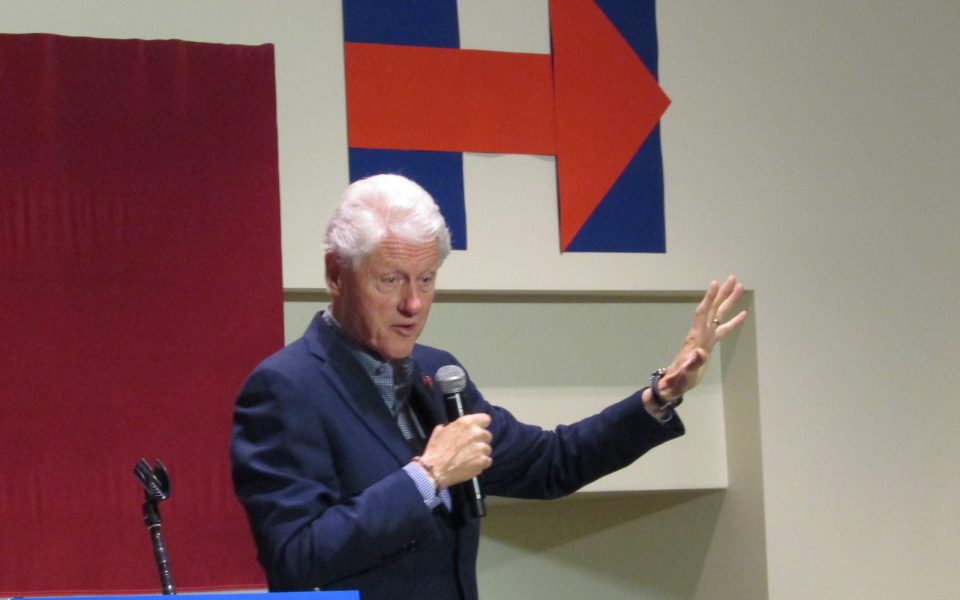by Jordan Green
Bill Clinton’s campaign stop at Elon Law School in downtown Greensboro on Monday carried a melancholy tinge in what should have been an invigorating rally for the undisputed Democratic frontrunner.
Although Hillary has a clear path to the nomination, time is not on the Clintons’ side. This isn’t the first time Bill has campaigned in North Carolina as a surrogate for Hillary: Eight years ago he found himself cautioning against the unrealistic promises of an insurgent candidate named Barack Obama. Today, as the former secretary of state, Hillary Clinton has inherited the mantle of Obama, the cautious president maneuvering within the limitations of Washington politics.
Bill Clinton talked about the gap between Obama’s positive economic report in his last State of the Union address and personal challenges of many Americans, counseling patience with an argument that recoveries from serious financial crashes historically take about 10 years.
“Why is everybody so torn up in this election?” Clinton asked. “Why do they have a food fight every time they have a Republican debate? Because too many people look at that beautiful picture that the president painted, and they cannot find themselves and their families in that picture to save their lives. That is the space in which this election is taking place.
“We got the jobs back early, but not the pay,” he continued. “So people are full of anxiety and anger, fear, all kinds of stuff.”
Alluding to the politics of white resentment and populism driving support for Donald Trump — Hillary’s likely opponent in the general election — Clinton quoted the Irish poet William Butler Yeats: “Too long a sacrifice can make a stone of the heart.”
People begin to despair when they stop believing that they have any realistic expectation of improving their condition, he said.
“You think you cannot give your children a better future than you had,” Clinton said. “So what we have to do is put everybody in the picture the president painted. That’s why Hillary’s running for president — so we can all rise together.”
The problem with Clinton’s message to just hang on a little bit longer is a creeping sense among many Americans that maybe this isn’t the slow curve of the recovery, but rather the plateau. Most Americans instinctively understand that the hollowing of the American economy has been underway for decades, whether it was the overleveraged personal debt that sustained the housing bubble of the 2000s or the ramp-up of mass incarceration that artificially reduced the unemployment rate in the 1990s.
Arguing for incremental progress against Bernie Sanders’ “political revolution,” Clinton ran through layers of policy prescriptions for breaking down barriers to shared prosperity. He said the government needs to make it affordable for community banks to make small-business loans, without explaining exactly how to make that happen. The Affordable Care Act needs to be expanded to bring down costs, he said, rather than replacing it with single-payer. And he said that Hillary’s plan for relieving debt from student loans “works better” than Bernie’s promise to make college education free.
None of it exactly lit the crowd on fire.
Riffing on public policy like the college professor he once was, he argued a limited government position that sounded remarkably like the Bill Clinton of the 1990s.
“The people who can pay a little should pay a little and upper-income parents should pay for their own kids’ tuition,” he said. “No point in recycling it through the government. Why do I say that? Because we need to ask the people who have made money since the crash — the highest income people — to pay more. If you’re gonna raise taxes on me, for example — and we always paid the maximum rate — what I want to do is for you to take the money and put the American people back to work.”
One of his loudest applause lines came for one of the issues to which Bill Clinton gave the most scant attention — prison reform.
“We have too many young people in prison for too long for nonviolent offenses,” Clinton said. “But it’s important before they get turned out that we give them the education and training they need to get a job when they get out.”
That piece of wisdom would have helped 22 years ago when President Clinton signed the 1994 crime bill, which eliminated Pell grants for lower-income prisoners to pursue post-secondary education during their incarceration. And it would have helped in 1998, when Clinton signed the Higher Education Act, which included a provision to deny federal student aid to individuals convicted of drug-related offenses. (For, the record, Sen. Sanders voted for both bills.)
There are dangerous winds of white nationalism blowing on the right, and a revived socialism troubling the waters on the left. Holding to the middle course, the Democratic Party’s elder statesman offered reassurance.
“If you get rid of the barriers and you build the ladders,” he said, “we’ll be fine.”
The question is whether the American voters will believe it this time.
Join the First Amendment Society, a membership that goes directly to funding TCB‘s newsroom.
We believe that reporting can save the world.
The TCB First Amendment Society recognizes the vital role of a free, unfettered press with a bundling of local experiences designed to build community, and unique engagements with our newsroom that will help you understand, and shape, local journalism’s critical role in uplifting the people in our cities.
All revenue goes directly into the newsroom as reporters’ salaries and freelance commissions.


Leave a Reply